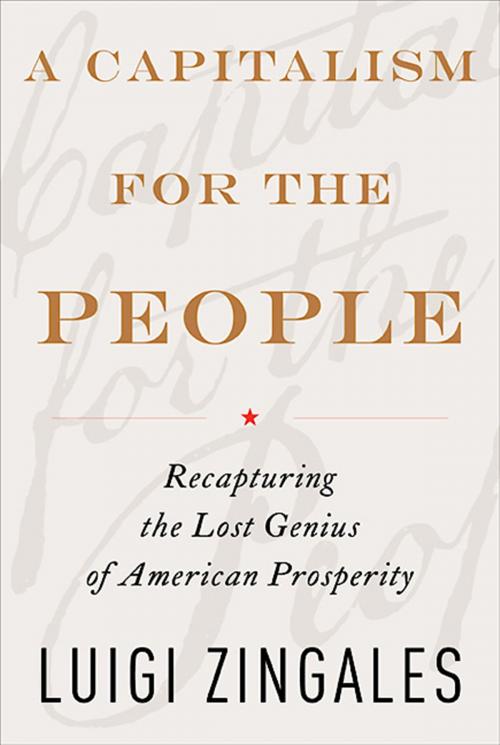A Capitalism for the People
Recapturing the Lost Genius of American Prosperity
Business & Finance, Economics, Economic History| Author: | Luigi Zingales | ISBN: | 9780465038701 |
| Publisher: | Basic Books | Publication: | February 11, 2014 |
| Imprint: | Basic Books | Language: | English |
| Author: | Luigi Zingales |
| ISBN: | 9780465038701 |
| Publisher: | Basic Books |
| Publication: | February 11, 2014 |
| Imprint: | Basic Books |
| Language: | English |
Born in Italy, University of Chicago economist Luigi Zingales witnessed firsthand the consequences of high inflation and unemployment-paired with rampant nepotism and cronyism-on a country's economy. This experience profoundly shaped his professional interests, and in 1988 he arrived in the United States, armed with a political passion and the belief that economists should not merely interpret the world, but should change it for the better.
In A Capitalism for the People, Zingales makes a forceful, philosophical, and at times personal argument that the roots of American capitalism are dying, and that the result is a drift toward the more corrupt systems found throughout Europe and much of the rest of the world. American capitalism, according to Zingales, grew in a unique incubator that provided it with a distinct flavor of competitiveness, a meritocratic nature that fostered trust in markets and a faith in mobility. Lately, however, that trust has been eroded by a betrayal of our pro-business elites, whose lobbying has come to dictate the market rather than be subject to it, and this betrayal has taken place with the complicity of our intellectual class.
Because of this trend, much of the country is questioning-often with great anger-whether the system that has for so long buoyed their hopes has now betrayed them once and for all. What we are left with is either anti-market pitchfork populism or pro-business technocratic insularity. Neither of these options presents a way to preserve what the author calls the lighthouse” of American capitalism. Zingales argues that the way forward is pro-market populism, a fostering of truly free and open competition for the good of the people-not for the good of big business.
Drawing on the historical record of American populism at the turn of the twentieth century, Zingales illustrates how our current circumstances aren't all that different. People in the middle and at the bottom are getting squeezed, while people at the top are only growing richer. The solutions now, as then, are reforms to economic policy that level the playing field. Reforms that may be anti-business (specifically anti-big business), but are squarely pro-market. The question is whether we can once again muster the courage to confront the powers that be.
Born in Italy, University of Chicago economist Luigi Zingales witnessed firsthand the consequences of high inflation and unemployment-paired with rampant nepotism and cronyism-on a country's economy. This experience profoundly shaped his professional interests, and in 1988 he arrived in the United States, armed with a political passion and the belief that economists should not merely interpret the world, but should change it for the better.
In A Capitalism for the People, Zingales makes a forceful, philosophical, and at times personal argument that the roots of American capitalism are dying, and that the result is a drift toward the more corrupt systems found throughout Europe and much of the rest of the world. American capitalism, according to Zingales, grew in a unique incubator that provided it with a distinct flavor of competitiveness, a meritocratic nature that fostered trust in markets and a faith in mobility. Lately, however, that trust has been eroded by a betrayal of our pro-business elites, whose lobbying has come to dictate the market rather than be subject to it, and this betrayal has taken place with the complicity of our intellectual class.
Because of this trend, much of the country is questioning-often with great anger-whether the system that has for so long buoyed their hopes has now betrayed them once and for all. What we are left with is either anti-market pitchfork populism or pro-business technocratic insularity. Neither of these options presents a way to preserve what the author calls the lighthouse” of American capitalism. Zingales argues that the way forward is pro-market populism, a fostering of truly free and open competition for the good of the people-not for the good of big business.
Drawing on the historical record of American populism at the turn of the twentieth century, Zingales illustrates how our current circumstances aren't all that different. People in the middle and at the bottom are getting squeezed, while people at the top are only growing richer. The solutions now, as then, are reforms to economic policy that level the playing field. Reforms that may be anti-business (specifically anti-big business), but are squarely pro-market. The question is whether we can once again muster the courage to confront the powers that be.















